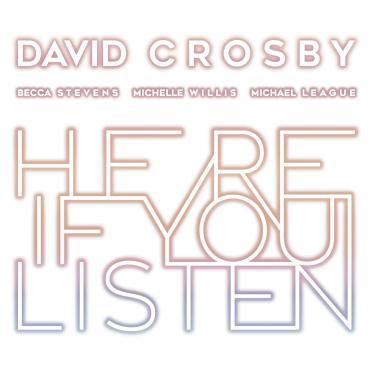David Crosby Still Trying to Get Back to the Garden

For people of a certain age, the highlight of David Crosby’s latest album Here If You Listen is a new rendition of “Woodstock.” Yes, that Woodstock — the 1969 one where a 28-year old Crosby was “scared shitless” along with his buddies Stephen Stills, Graham Nash, and Neil Young.
Now 77, Crosby has spent most of the post-CSNY years hammering out a solo career that, while modestly successful, has never captured the glory of that band’s heyday or that of The Byrds, where he resided beforehand. So the presence of “Woodstock,” the generational anthem written by Joni Mitchell, could be taken as a hint that Crosby believes he may have captured the magic again. He has got some help. Here If You Listen is marketed as a Crosby album, but in truth it could easily have been Crosby, League, Willis, and Stevens.
Those “helpers” — Michael League, Michelle Willis, and Becca Stevens, together as Lighthouse – make this a far more harmonic and polished production than a mere solo album. They offer a new turn to an old road, something Crosby himself recognizes: “If leaving a group like Crosby, Stills & Nash was like jumping off a cliff, then finding the Lighthouse Band was like growing wings halfway down. These three people are so startlingly talented, I literally couldn’t resist making this album with them.”
Most of the songs on the album (Crosby’s fourth in five years) are folky, trippy tunes that hark back to an earlier era without actually sounding dated. Voices float across the music. Some move off on their own. Others stay glued to the plot. They all return to center when it is time.
One example is “Janet,” said to be inspired by Little Feat. It starts off with a chunky Crosby guitar riff and then tells the tale of a woman who has had her man stolen: “Sitting at home / Feeling alone / You spend your whole life looking behind / You’ve got to let it go for the sake of your soul / Janet girl.” It is soulful and bluesy and musically complex, as indeed is much of the album.
“Buddha on a Hill” is another example. The male voice anchors the song with “There’s a Buddha on the hill / Smiling” while gentle female ones musically envelop it with an almost ghostly “Here / If you listen.” The guitar-work is ethereal.
Meanwhile, there are two tracks that are bound to be pored over by Crosby aficionados. They are simply named for years — “1967” and “1974” — and are based on what are described as “decades-old demos.” Now it may be a coincidence, but both years were significant in Crosby’s musical life.
The first was when he broke up with The Byrds, amid internal rancor, before signing up with Stills, Nash and Young. Appropriately, the track starts like a CSNY tune-up session and builds into a lovely jam with the only lyrics being harmonic doos and dahs.
The second year was when CSNY re-formed, went on the drug-fueled road, then failed to put together a new album, again because of infighting. “1974” is gentle folk, Crosby-style, containing this retrospective advice: “If you don’t like the story you’re in / Well then pick up your pen / And then write it again.”
As I say, may be a coincidence.
Which brings us to the new version of “Woodstock,” the last track on the album. Far less rocky that the CSNY version and less plaintive than Mitchell’s original, it is a beautiful 2018 reboot. Given its hippie roots and Vietnam War references, you would think it might be dated. But looking around it really isn’t.
“We are stardust / Billion-year old carbon / We are golden / Caught in the devil’s bargain / And we’ve got to get ourselves / Back to the garden.”




